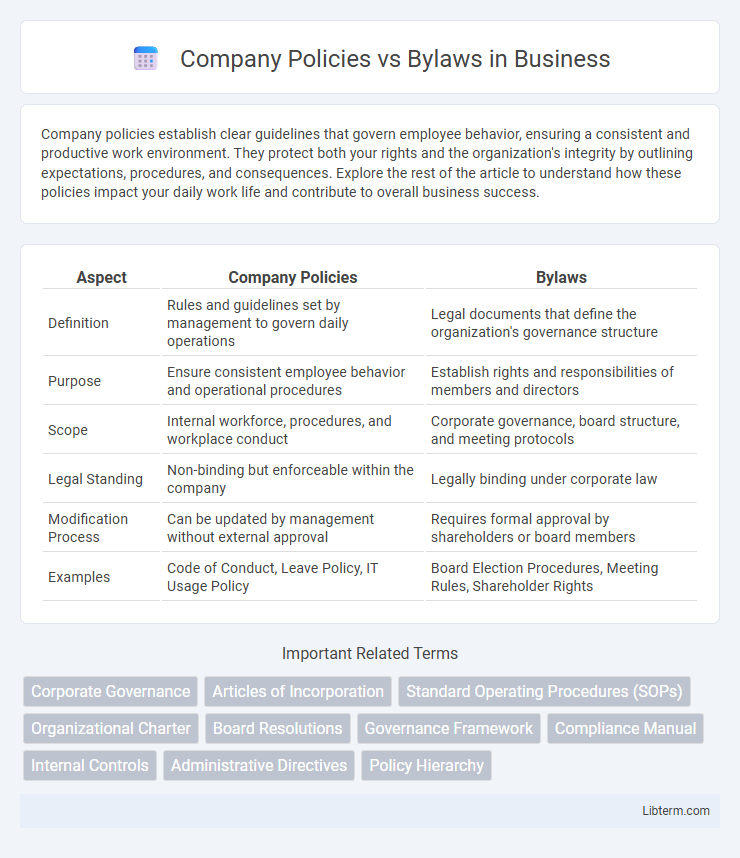Company policies establish clear guidelines that govern employee behavior, ensuring a consistent and productive work environment. They protect both your rights and the organization's integrity by outlining expectations, procedures, and consequences. Explore the rest of the article to understand how these policies impact your daily work life and contribute to overall business success.
Table of Comparison
| Aspect | Company Policies | Bylaws |
|---|---|---|
| Definition | Rules and guidelines set by management to govern daily operations | Legal documents that define the organization's governance structure |
| Purpose | Ensure consistent employee behavior and operational procedures | Establish rights and responsibilities of members and directors |
| Scope | Internal workforce, procedures, and workplace conduct | Corporate governance, board structure, and meeting protocols |
| Legal Standing | Non-binding but enforceable within the company | Legally binding under corporate law |
| Modification Process | Can be updated by management without external approval | Requires formal approval by shareholders or board members |
| Examples | Code of Conduct, Leave Policy, IT Usage Policy | Board Election Procedures, Meeting Rules, Shareholder Rights |
Introduction to Company Policies and Bylaws
Company policies are internal guidelines established by an organization to govern day-to-day operations, employee behavior, and compliance with legal and regulatory requirements. Bylaws are formal, legal documents that define the structure, procedures, and governance of a corporation, including roles of directors and shareholders. Understanding the distinction between company policies and corporate bylaws is essential for effective organizational management and legal compliance.
Defining Company Policies
Company policies are formal guidelines established by an organization to direct employee behavior and operational procedures, ensuring consistency and compliance within the workplace. These policies typically cover areas such as attendance, workplace safety, harassment prevention, and ethical conduct, serving as a foundation for daily decision-making. Unlike bylaws, which govern the structural and legal framework of a corporation, company policies focus specifically on internal operational rules and employee expectations.
Defining Corporate Bylaws
Corporate bylaws serve as the foundational governance documents outlining the internal rules and procedures for managing a corporation. They define key elements such as the roles and responsibilities of directors and officers, meeting protocols, and voting processes essential for corporate decision-making. Unlike company policies, which address day-to-day operational guidelines, bylaws establish the legal framework that ensures compliance and organizational structure.
Key Differences Between Policies and Bylaws
Company policies establish internal guidelines for employee behavior and operational procedures, focusing on day-to-day management, while bylaws define the formal governance structure of a corporation, detailing roles, responsibilities, and procedures for board meetings and shareholder interactions. Bylaws are legally binding documents required for corporate compliance and typically harder to amend, whereas policies are flexible and can be updated regularly to reflect organizational changes. Understanding these distinctions ensures proper adherence to legal requirements and effective internal management.
Purpose and Importance of Policies
Company policies establish specific guidelines that govern daily operations and employee behavior, ensuring consistency and compliance within the organization. Bylaws serve as foundational rules defining the company's structure and governance, but policies provide actionable standards to navigate routine decisions. Effective policies reduce risks, enhance operational efficiency, and promote a positive workplace culture by clearly communicating expectations.
Purpose and Importance of Bylaws
Bylaws serve as a foundational legal framework that governs a company's internal management and operational procedures, ensuring compliance with state laws and organizational consistency. They define the roles, responsibilities, and powers of directors, officers, and shareholders, establishing clear protocols for decision-making and dispute resolution. The importance of bylaws lies in their ability to provide stability, prevent conflicts, and facilitate effective corporate governance.
Development and Approval Processes
Company policies undergo a structured development process typically led by HR or compliance teams, involving research, stakeholder input, and alignment with organizational objectives before approval by senior management. Bylaws are developed primarily by founders or legal advisors to establish foundational governance rules, with approval required from the board of directors or shareholders. The distinction lies in policies being flexible documents subject to frequent updates, while bylaws are formal, legally binding guidelines that require formal amendments through a defined approval process.
Legal Implications and Compliance
Company policies provide detailed guidelines for employee behavior and operational procedures, ensuring day-to-day compliance with internal standards and external regulations. Bylaws establish the foundational governance structure of a corporation, defining roles, responsibilities, and decision-making processes in accordance with corporate law. Failure to adhere to either policies or bylaws can result in legal liabilities, regulatory penalties, and challenges in corporate governance enforcement.
Examples of Typical Company Policies and Bylaws
Company policies typically include guidelines on employee conduct, attendance, dress code, and confidentiality, ensuring smooth daily operations. Bylaws generally cover corporate governance topics like board meeting procedures, shareholder voting rights, and officer roles, establishing legal and organizational structure. Understanding these distinctions helps maintain compliance and operational efficiency within a business.
Updating and Enforcing Policies vs Bylaws
Company policies require frequent updates to reflect evolving operational needs and regulatory compliance, ensuring clear enforcement through internal communication and consistent application by management. Bylaws, typically established during incorporation, are updated less often and mandate formal procedures like board or shareholder approval, with enforcement governed by legal standards and corporate governance frameworks. Regular review cycles for policies enhance organizational agility, whereas bylaws maintain structural integrity and legal accountability within the company.
Company Policies Infographic

 libterm.com
libterm.com